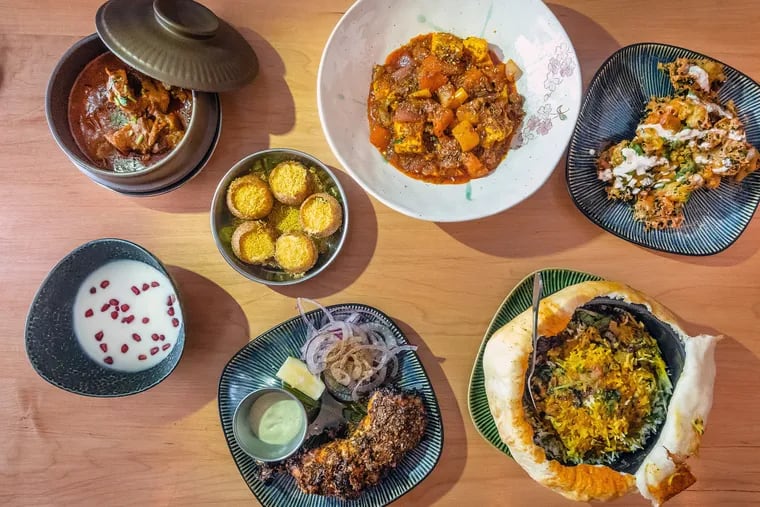Fast-rising Unapologetic Foods — whose collection of New York restaurants includes the Michelin-starred Semma — has leased a space amid the booming Fishtown scene, where it plans to open an Indian bar-restaurant next year.
Roni Mazumdar, who owns Unapologetic with James Beard Award-winning chef Chintan Pandya, told The Inquirer that the name and precise concept have not been determined.
The restaurant will serve street food and homestyle food from lesser-traveled Indian regions — Unapologetic’s calling card. “If there’s one thing it’s not going to do is to compromise on the flavors,” Mazumdar said, alluding to the company ethos.
The location — a mixed-use building under construction at Frankford and Columbia Avenues, across from the Fishtown post office — will seat about 90 people on the ground floor, which will have an open kitchen and grill, and in what Mazumdar called a “minibar” in the basement.
“I couldn’t have thought of a better food city than Philadelphia in my mind,” Mazumdar said, aside from the proximity to New York. He called Philadelphia’s scene “really exciting, with people who are taking chances.”
Mazumdar cited Chutatip “Nok” Suntaranon, the James Beard Award-winning chef at the nearby Kalaya, as an inspiration. “What she has done with Thai cuisine is remarkable and I respect her so much for the kind of voice that she has brought to it,” said Mazumdar. While touring properties with the deal’s broker, Stefanie Gabel of MSC, Pandya recognized her from the Beard community and they caught up.
It was shortly after 2018′s opening of Adda, in Queens, that the restaurant group came into its name. A customer complained about Pandya’s bold flavors, and Mazumdar refused to back down. “The idea was to really create something that took ownership of who we actually are,” Mazumdar said. “We jumped into building a company where it was not about appealing to anybody else. It was just being true to ourselves.”
Mazumdar said he and Pandya weren’t even sure if Adda would work. “Next thing you know, there’s this piece that came out in [the blog Grubstreet] saying it’s the most exciting Indian restaurant in New York at the time,” he said.
Mazumdar said almost 70% of their customers are non-Indian by ancestry and that he and Pandya are giving them a picture of traditional Indian cooking, as served outside of big cities and fancy hotels. “If I invite you to my home, I want to invite you to a place that’s actually mine,” he said. “If I change everything about myself, are you really friends with me anymore? That’s been the whole challenge of immigrants. For too long, if you take all of the quote unquote ‘ethnic food’ in America and add them up, that’s the majority of Planet Earth. Yet we all reside on the ‘international’ aisle of [American] supermarkets. I think it’s about time we have a real representation for who we are as a community.”
Mazumdar, 41, was born in Kolkata, immigrated as a boy to the Bronx, and opened the original Masalawala with his father, Satyen, in 2011. Pandya, 45, from Mumbai, cooked around India for five years before working in Singapore. After working briefly in other U.S. cities, in 2016 he arrived in New York to became executive chef at Junoon, an Indian fine-dining restaurant. A year later, Mazumdar and Pandya went into business with a restaurant called Rahi in Greenwich Village, which later gave way to Semma.
Besides Semma, meaning “fantastic” in Tamil, Mazumdar and Pandya own Adda Indian Canteen, Dhamaka, Masalawala & Sons, Rowdy Rooster (a chicken shop that they hope to syndicate to Philadelphia and other cities), a soon-to-open kebab house called Kebabwala, and Naks, a Filipino restaurant offering multicourse kamayan feasts.
Adda made top 10 lists in 2019 from Food & Wine, Eater, and bon appétit. Semma was one of Bon Appétit’s top 10 new restaurants of 2022 and earned a Michelin star. Chintan won the 2022 James Beard Award for best chef New York State for his work at Dhamaka, which was also named the top restaurant of the year by the New York Times and Esquire.
Might Unapologetic be growing too fast? “I think we’re not moving fast enough,” Mazumdar said. “We grow in a very organic way. We don’t jump into the idea of saying ‘Here’s our five-year plan and I have to have this number of restaurants and this amount of revenue.’ We look at the market, at what people are craving, and create products and ideas based on that in many ways. We don’t judge ourselves based on the number of restaurants we create, but the number of hearts we change.”

